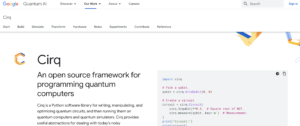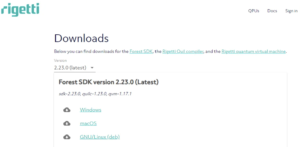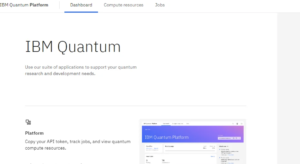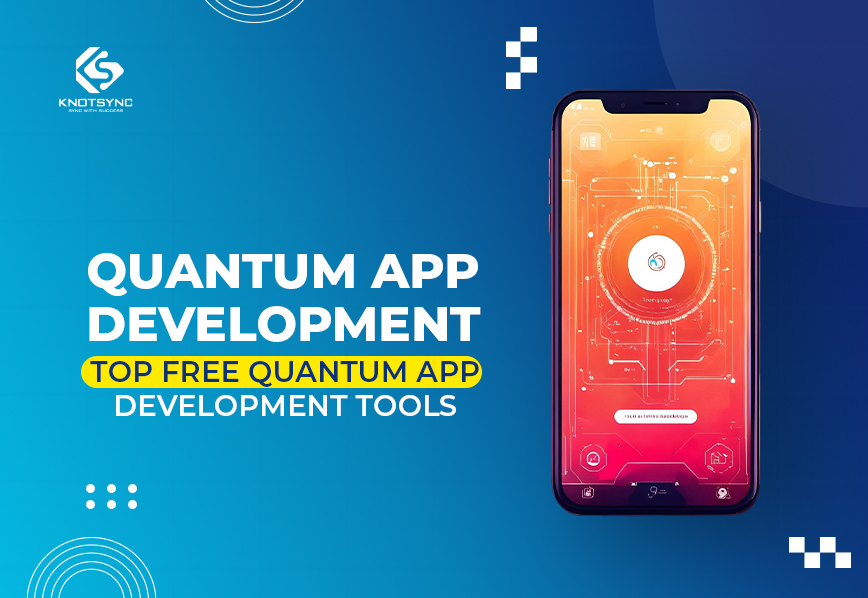The term “Quantum App Development” sounds like something that came straight out of some Sci-Fi fantasy novel or movie about “quantum computing.” When regular folks like us come across this word, we imagine futuristic objects and massive infrastructures full of mysterious scientists in white coats staring at the computer screens typing on their tablets cryptically, big humming interstellar sensors, and AI voices. However, we are not entirely wrong to think this way. It wasn’t long ago that quantum computing was still considered a fresh and advanced area of technology that only experts could understand.
According to Statista’s online report, it is expected that by the year 2027, the revenue in the global quantum computing market will hit the $8.6 billion mark. These figures are living proof that quantum computing has made business problem-solving more effortless, which is why there is a demand for app development today!
In-Depth Exploration of Quantum App Development – A Comprehensive Guide
You need to understand the concept of quantum computing first before knowing quantum app development, as it will offer a clear explanation of what the term means.
What is Quantum Computing?
Quantum computing is an emerging and developing technology that uses principles of quantum mechanics, a branch of physics that studies particles of any matter on the quantum level. Traditional computers work with the help of altering information in binary forms called “bits,” which are basically inputs of either 0s or 1s. Quantum computers, on the other hand, utilize “qubits,” which can be considered as binary units or digits. However, instead of being only 0 and 1, it can also exist as both 0 and 1 simultaneously in a state called ‘Superimposition.’
This, combined with a quantum property of quantum systems known as ‘entanglement and quantum interference,’ permits the quantum computer to perform exponentially numerous computations simultaneously compared to traditional computers. This makes quantum computers capable of solving specific problems which are impossible to solve on a classical computer.
Different Types of Quantum Computing
Quantum computing operates by applying the principles of quantum mechanics to do tasks that are otherwise quite challenging for ordinary computers. Numerous types of quantum computing exist, depending on the method used to code, measure, and handle the quantum data.
1. Quantum Annealing
Quantum annealing can be defined as a quantum computing technology aimed at more efficiently solving optimization problems. This approach is based on the principle of quantum tunneling, a quantum mechanical property that helps search for potential solutions for an optimization problem in space. It enables the system to “penetrate” through the barriers to identify the global minimum, which signifies the most desirable solution.
D-Wave Systems is an example of a company that produces quantum computers with quantum annealing.
2. Analog Quantum Simulations
Analog Quantum Simulations are digital computers employing quantum technology to solve mathematical computational complexities. This type of quantum computing involves designing the quantum computer to behave as another quantum system; in other words, it makes a physical model of the system of interest. This approach is especially relevant in those areas where direct calculation of quantum systems on classical devices is complex – like in quantum chemistry and condensed matter physics.
3. Universal Quantum Computing
This type of quantum computing is typically what the public means when it refers to quantum computing. Such quantum computers employ quantum gates to perform quantum bits, just like traditional computers use logical gates to perform operations on binary digits. Another type of quantum computer is a universal quantum computer, which executes any computation that a quantum algorithm can specify. They promise a broad spectrum of possible applications, from deciphering current cryptography systems to modeling complicated biological systems.
IBM and Google are some of the firms that are currently making efforts to develop universal quantum computers.
What Is Quantum App Development?
Quantum app development uses quantum technology to build software applications that run on mobile devices. They can solve broader and complex range of problems with more computational power. Additionally, these apps come with enhanced features and functionalities compared to their traditional counterparts; they can also process the most significant data sets or business flows faster through their enhanced computing ability.
With this computing power, quantum app development solutions can resolve any problem accurately.
Benefits of Quantum App Development
Quantum computing is quite complicated! So, let’s forget the complex jargon and principles of quantum physics and shift our focus to how quantum app development can directly and straightforwardly enhance your business. Now that you have a solid understanding of quantum computing, it is time to explore the benefits of quantum app development.
Enhanced Processing Power
The main benefit of quantum computing in app development is its high performance compared to desktops and laptops. Using qubits with multistate properties provides a tremendous leap forward for computers, especially when processing massive amounts of data, which is much longer than classical computers. This enhanced computing capacity can save time and solve problems efficiently and faster.
Improved Speed
Quantum computing can process massive and parallel data because of its unique parallel computing power conferred by superposition and entanglement. Thus, applying quantum app development solutions would mean scheduling of work, which significantly reduces the time it takes to perform such complex calculations and hence provide quicker insights for decision-making and speed advantage in applications such as real-time analytics, financial modeling, logistical modeling, etc.
Highly Secured
Quantum computing manifests an entirely different security paradigm. Quantum cryptography and quantum key distribution (QKD) offer almost unbreakable encryption because any attempt to access a quantum system alters or interferes with its state; thus, allowing eavesdropping is impossible. This can be highly secure and assist the business in preventing cyber threats. Quantum application development can benefit industries focused on susceptible data, such as finances or healthcare institutions.
More Productivity
Quantum apps are highly efficient as they are both fast and powerful; they can also allow people to use quantum computing technologies to automate and speed up certain massive operations. Within high-performance computing, they can work with large volumes of data, identify patterns in big data, and perform super-computing calculations in a way that would not be possible with standard computers.
Affordable Method
Once fully developed, Quantum computing can be a highly effective and affordable method to solve computationally challenging problems. Research has shown that some of the processes that a traditional computer will take years to solve could be solved by a quantum computer within the shortest time possible, thus saving energy, time, and cost.
Better Execution of Algorithms
Quantum computers perform complex algorithms better than classical computers due to their potentials. So, the above is about how combining mobile app development with quantum computing will allow for better optimization, machine learning (ML), and artificial intelligence (AI) algorithm execution, leading to more innovations and improvements in these fields. Quantum machine learning is one such field that offers the prospect of enhancing the training of AI and improving the robustness and accuracy of artificially intelligent systems
Top 7 Free Quantum App Development Tools in 2024 (Open-Source Tools)
In the age of the quantum revolution, a wide range of free, open-source quantum app development tools have been developed. Each has functions and features to fulfill different requirements of scientists and developers. They range from all-inclusive quantum development kits through simulators and programming languages designed specifically for this purpose, thus giving a wide range of options that can be used as a stepping stone into your journey towards quantum computation.
As we step into the free quantum app development realm, let us discuss some of the key players in the market who are changing how things work and their potential effects on the future of quantum computing.
1. ProjectQ

Based on qubit operators Matlab and C++, the open-source quantum computing software framework ProjectQ is built in Python. It permits users to conversely run their quantum programs in Python through a simple and attrative syntax. After the translation, these programs can be run for both simulators and on the quantum computer, including the IBM Quantum Experience platform. In the long term, we will also develop installments for other hardware platforms. All the links to the machine-readable code for this project and documentation for a third-party library called FermiLib to solve problems related to fermionic quantum simulation are also available in the ProjectQ tool.
2. Cirq

Cirq is a Python-based cohesive software framework that lets us create, modify, and invoke NISQ circuits. Cirq can be found here. Advanced by Google’s AI Quantum Team, although it was never an official Google product, go through the initial release version of the alpha stage. Cirq tool can be used with OpenFermion-Cirq of the platform, which is customizable for quantum algorithms design for chemical problems. Cirq works with this software directly with the help of many early adopters from other corporations in the domain of quantum computing software.
3. Q-CTRL Python Open Controls

Q-CTRL Python Open Control is a free online quantum computing toolkit from the same developer-Q-CTRL–as the open-source QC toolbox, which is highly efficient in implementing published papers’ known resilient quantum control protocols. The longing of the package through publications and experimentations reported by the community ensure this is the most comprehensive and complete library of quantum control techniques. It should also have a user-friendly output like a terminal, allowing users to deploy these controls on custom hardware, public cloud quantum computers, and the Q-CTRL suite of products.
4. Strawberry Fields

Xanadu has developed Strawberry Fields, an open-source pump for quantum programming designed primarily for photonic circuits and quantum machine learning. Based on Python, Strawberry Fields is intended as a complete package for creating and testing quantum computing experiments and application development by programmers and researchers. Strawberry Fields highlights an essential aspect of the quantum photonic circuits used to process quantum information by using the photons as qubits. This approach harvests key benefits, such as long coherence times and low error rates, thereby implying its suitability for communication-oriented applications.
5. Qiskit

Qiskit is a free-to-use toolkit distributed by IBM that supports the development of quantum code. It provides an integrated toolkit and reference libraries explicitly dedicated to the design, simulation, and execution of quantum circuits. Qiskit creates an ecosystem that suits both learners and experienced developers to have firsthand experience and experiment with theoretical concepts of quantum computing. Qiskit’s modular architecture is one of its most essential characteristics, which makes it easy for users to use different parts and components according to their requirements. These cover quantum circuit building, visualization, optimization, and execution in (or against) quantum hardware or simulators.
6. Forest SDK

Rigetti Computing developed the Forest SDK with the aim to give a wide range of computer science students and professionals a helping hand in getting them started in quantum computing. The main trait of the Forest SDK is the language Quil, which makes quantum algorithms accessible and has semantics close to human writing. Quil provides the ability to write quantum circuits, apply them to quantum gates, and do quantum operations using quantum gates. Thus, it is a hyper–intuitive language for quantum programming. One of the necessary things of the Forest SDK is the elaborate quantum simulators set, which is among its outer qualities. These simulators let users run quantum circuits and algorithms on basic computers, and they provide a birds eye view of the behavior of these circuits and algorithms.
7. Intel Quantum Simulator

Last is an offering from the Tech Giant Intel, named Intel® quantum simulator. The device used to be known as much more exciting with the name qHiPSTER, which simulates a single node or distributed high performance as an open source programming and can simulate a general single-qubit gate and a two-qubit controlled gate. This simulator has been uploaded to GitHub, thus making it accessible to users who wish to simulate up to 40 qubits. This simulator is geared toward software programmers who want to test their code before running it on an actual device.
How Much Does It Cost To Develop a Quantum App?
The quantum app development is in its early stages and, therefore, is rather costly due to the nature of the project or technology used. The cost of developing a quantum app depends on its complexity, meaning that if the app’s complexity is increased, it will require more quantum algorithms, simulations, etc. Therefore, it will cost more to develop.
Another factor contributing to the cost is the experience and location of the development team. It has been discovered that teams with quantum expertise and knowledge would be paid more than others. But, expenses required for development are often higher or lower depending on specific locations.
| App Complexity | Estimated Cost | Time Duration |
| Basic Quantum App | $10000 – $15000 | 2 – 3 Months |
| Modern Quantum App | $16000 – $23000 | 4 – 6 Months |
| Complex Quantum App | $30000+ | 7 – 12 Months |
These are the cost estimation of quantum app development on a fundamental level. You can calculate the development cost by using this formula:
Cost of Quantum App Development = Hourly Charges of Developer * Total Time Duration of Development.
The total duration depends on the app’s functionality and intricacy and the team’s knowledge. To put a figure to this, the cost of developing a quantum app from basic to advanced level typically lies between. However, the prices can go up to $100,000+ for its complexities on enterprise applications.
The bottom line is to hire a development team that clearly understands the scope and can give detailed breakdowns of costs according to the project’s needs and expense limit. This is because fees are not standardized as in most other specialized emerging technologies.
What Is the Future Scope of Quantum App Development?
Quantum app development is set to have a brighter future up ahead because most quantum development kit, machines, and gadgets are set to have an incredible quantum capability. Future app developers will be able to develop apps with unprecedented features and capabilities through integration of quantum app development solutions, and all industry verticals will
Quantum app development is set to have a brighter future because most machines and gadgets are set to have a quantum capability. Thus, all the industry verticals will have improved customization with quantum app development solutions. In the future, app developers will be capable of creating applications with huge potentials and features using the support of AR/VR, AI, and ML. Here are few noticeable improvements for the future scope of quantum app development:
- Speedy apps: ease of application processing, computation, and access at blazing speeds
- Energy efficiency: more applications and technologies effectively providing a positive impact on the green earth
- Weather predictions enable more accurate weather predictions, which has helped save millions of lives and property.
- Sustainable apps: to support this, the quantum app development system would implement simplicity and easy-to-maintain codes
- AI&ML: New apps that leverage AI and ML in the quantum environment to provide an optimized user experience aligned with an objective
- Better security: most intensified and practically impenetrable barriers of security in apps
- Super-accurate GPS: exact location tracking in the emerging quantum appsx
Conclusion
We have reached the final part of the article. From this post, you must understand that the world of quantum app development is at the threshold of changing the ground in many industries since they will access a new dimension of computing power and security. The quantum capabilities, which can solve challenging and intricate problems with incredible speed and even impenetrable encryption, change our world and how we do business in the digital era. For the best app development services you can contact our expert team.



